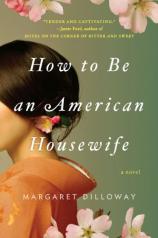Reading Group Guide
Discussion Questions
How to Be an American Housewife

1. How to Be an American Housewife is partially based on the author and her mother’s personal experiences. As a reader, do you find it more interesting when you know that there is a nonfiction element to the story?
2. Did you sympathize with Shoko’s decision not to marry Ronin? Do you think she could have --- or should have --- accepted his proposal?
3. Shoko marries Charlie in order to leave Japan and live a more comfortable life in America. She thinks Charlie will make a good husband, but she doesn’t yet love him. Does she turn out to be wrong, or right? Would she have been better off staying in Japan, and marrying a Japanese man?
4. A recurrent theme in the novel is how mothers and daughters communicate (for better and worse). In what ways did you feel that the difficulties between Shoko and Sue were universal to mothers and daughters, and in what ways were they cultural? How is this born out in Sue’s relationship with Helena?
5. Shoko and Sue represent very different models and standards of motherhood, caretaking, and housekeeping. What do you consider their strengths and weaknesses, and what would you consider the most essential qualities?
6. The chapters are introduced with snippets from Shoko’s “How to Be an American Housewife” guidebook. How did you respond to that book’s advice? Did it surprise you to learn that the author’s mother had a very similar book, and that many women like Shoko were expected to follow its advice?
7. Shoko’s guidebook advises women to raise their sons differently from their daughters. Do you think boys and girls are raised differently in all cultures, including your own, and what impact does this have on all of us?
8. Prejudice and stereotypes are prevalent themes in the novel. The “How to Be an American Housewife” guidebook that Shoko is given by Charlie is largely based on stereotypes of Japanese and American cultures. It seems that all the characters feel or experience prejudice to some degree or another. Discuss the various forms of prejudice and stereotype in the novel, and their impact on the characters. Have you experienced similar sorts of prejudice in your own life?
9. The author took a risk by having two different narrators, both of whom have strengths and flaws. Are you more drawn to Sue or to Shoko? Do you think the story would have been stronger or weaker with one narrator?
10. Sue’s life and her sense of herself and her options are quite narrow and confined at the beginning of the novel. Her world expands dramatically by the novel’s end. How do the outer circumstances of Sue’s life change how she views herself on the inside? Do you think it’s significant that she finds herself in Japan?
How to Be an American Housewife
- Publication Date: August 5, 2010
- Genres: Fiction
- Hardcover: 288 pages
- Publisher: Putnam Adult
- ISBN-10: 0399156372
- ISBN-13: 9780399156373








